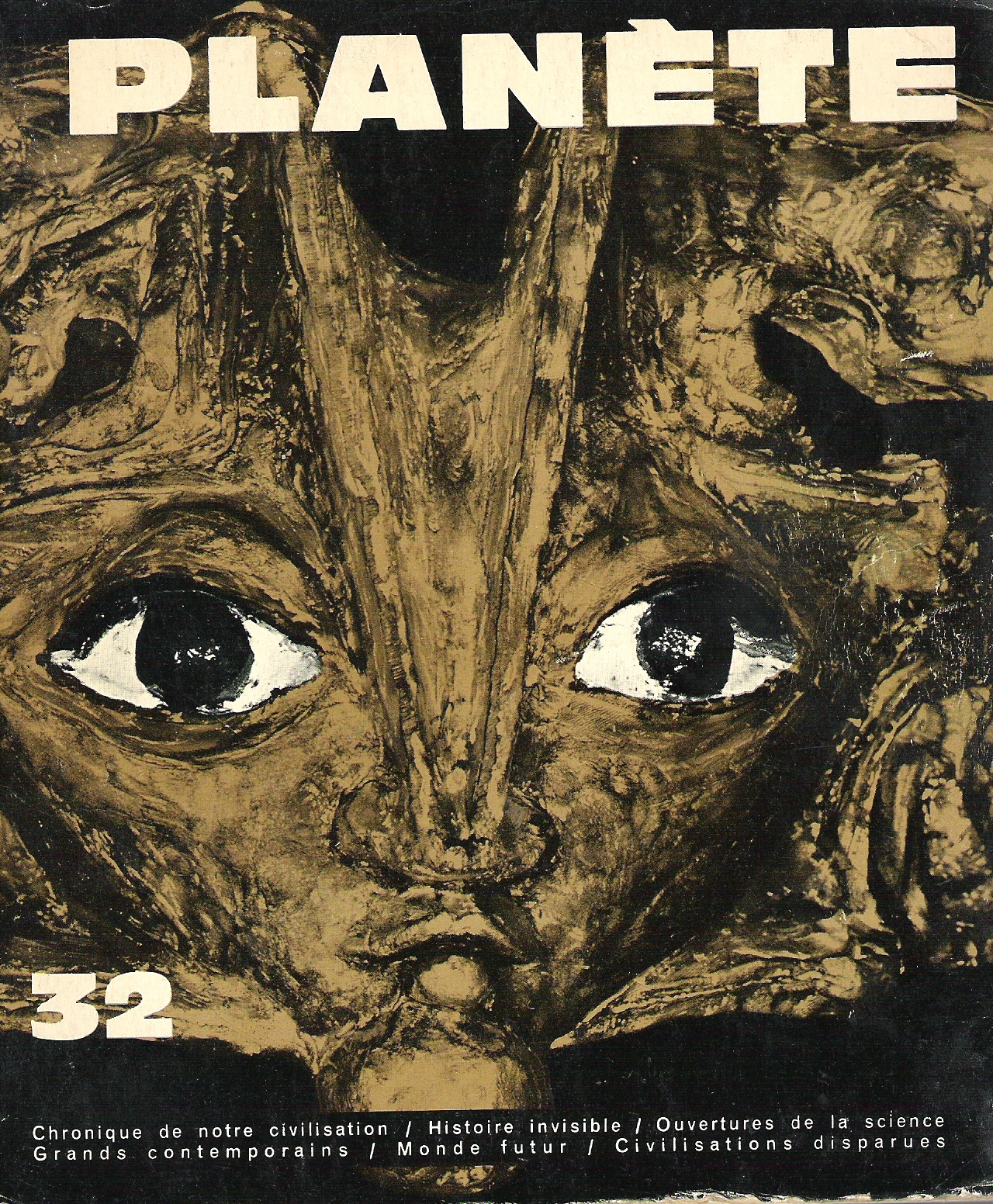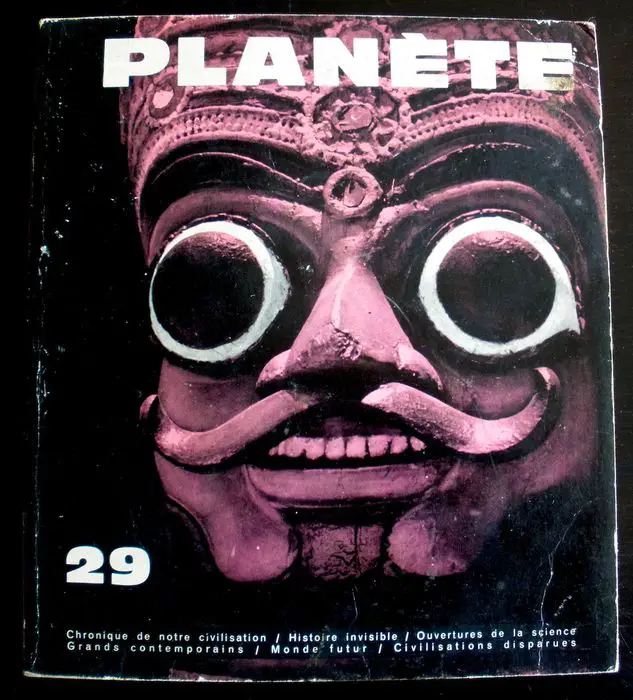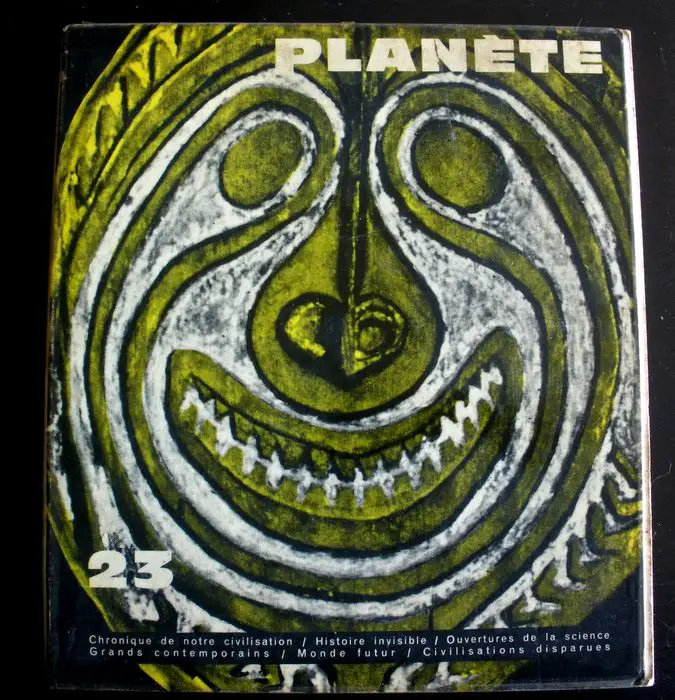Dedicated to science and mystery, past and future, archeology and science fiction, "Planète" was a multifaceted magazine, published by Louis Pauwels and Jacques Bergier, former authors of the cult book of "fantastic realism" "The morning of the wizards", which attracted also the attention of Mircea Eliade, who spoke of it in his work "Occultism, witchcraft and cultural fashions", published in 1976.
di Andrea Scarabelli
originally posted on the Author's blog on The newspaper
When, in 1960, the bookstores were invaded by the first edition of The morning of the wizards, its two authors - Louis Pauwels e Jacques Bergier - they immediately thought of following it up, as can be read in the pages of the volume, published by Gallimard: "We would like, if one day we had some money, procured here or there, to create and animate a kind of institution in which the studies begun in this book should be continued ". Thus the magazine was launched "Planète", then structured - according to legend - by Pauwels, returning from Lille, where he had gone to lecture on fantastic realism. On the train she thought about the title, the contents and the layout. «Planète» (with its columns, including Les civilizations disparues, L'histoire invisible, The vie spirituelle, Les overtures de la science, L'art fantastique de tous les temps, The future worlds...) kicked off one wave very fruitful editorial and cultural, which gave birth, just to give an example, to the series by Robert Laffront, "Les Énigmes de l'Univers", and J'ai Lu, "L'Aventure mystérieuse" (dedicated to: mysteries of history, vanished civilizations, secret societies, extraterrestrials, astroarchaeology, paranormal, reincarnation and alchemy). Dedicated to science and mystery, past and future, archeology and science fiction, «Planète» was a multifaceted magazine, which hosted everything and the opposite of everything. In the eighteenth issue, for example, there was the article by Jean Servier Je ne crois pas au progrès, preceded by an editorial by Pauwels entitled Nous croyons au progrès! In the same booklet, a double-page image showed on the left the painted face of an African and on the right, covered by a mask, that of a surgeon. The captions, "Mask of an initiate" and "Mask of a researcher", were surmounted by these words: "In our opinion, the modern world, which has opted for an external kind of knowledge, is about to rediscover the ways that lead to the invisible". Here, condensed, the spirit that animated the extraordinary periodical.
The "first library magazine" went through three phases: the forty-one issues of the first series came out between November 1961 and July-August 1968. Then, in September-October of the same year, "Nouveau Planète" began, which lasted until July- August 1971 (twenty-three issues). Finally, an attempt was made to resurrect it in December 1971: only three copies came out, under the name "Planète", under the direction of Serge Beucler, before finally closing its doors in April 1972. In those years, "Planète" was also launched in Italian, Canadian, South American, Dutch (still active), Spanish and English, giving rise to a large number of collateral initiatives, albeit quite independent from each other. Here are some of them, dating back to the early period (1961-1968): the itinerant "Conférences Planète", the "Ateliers Planète", the "Encyclopédie Planète" (animated by the Belgian writer Jacques Sternberg, who will also direct the realistic-fantastic magazine "Plexus »)," Présence Planète "," Trésors spirituels de l'humanité "(directed by the philosopher and theologian Jean Chevalier), the magazine" Pénéla "(" first women's library periodical "), together with organized trips and even campus summer ...
In short, a real network that transformed the magazine into a cult phenomenon, destined to profoundly shake European culture. While the rationalists at all costs were divided between raised eyebrows and worried looks, there was no lack of those who tried to investigate the origins of his success from a point of view different. This is the case of the historian of religions - and a prolific author of fantastic literature - Mircea eliade, avid reader of «Planète» and de The morning of the wizards, who in his studio Occultism, witchcraft and cultural fashions, from 1976, just reissued for the types of Lindau edited by Horia Corneliu Cicortas, took care of the magazine, within a chapter whose title, rather dry (A magazine entitled "Planète"), actually hides very enthusiastic tones. By courtesy of the publisher, we publish extensive extracts dedicated to Pauwels and Bergier, as well as to their works and editorial initiatives, real glimpses of the Elsewhere.
AS

Mircea ELIADE
"A magazine entitled« PLANÈTE »"
taken from "Occultism, witchcraft and cultural fashions"
Postal Code. I: “Cultural fashions and history of religions”, 1976
In the last four or five years Paris has been dominated, or rather conquered, by a magazine called "Planète". Some time ago the well-known and very serious Parisian newspaper "Le Monde" devoted two long articles to its unexpected and incredible success; 80.000 subscribers and 100.000 readers, for a rather expensive magazine, are in fact a unique phenomenon for France. Publishers of the magazine are Louis Pauwels, writer and disciple of Gurdjieff, e Jacques Bergier, a very popular science journalist. In 1961 they had published The morning of the wizards, a voluminous work that quickly became a best sellers. In fact, «Planète» was launched under the copyright of Morning of the wizards. The book is a curious blend of popular science, occultism, astrology, science fiction and spiritual techniques. But it is at the same time something more. It is a book that tacitly claims to reveal countless vital secrets, about our universe, about World War II, about lost civilizations, about Hitler's obsessive passion for astrology, and so on. Both authors read well; and Jacques Bergier, as I said, has a scientific basis. Consequently, the reader is convinced that he is being provided with facts, or at least with responsible hypotheses; he is convinced that he is not, however, duped. "Planète" is made with similar criteria and follows a similar model: you can find articles on the probabilities of life on the planets, on new forms of psychological warfare, on the perspectives of modern love, on HP Lovecraft and science fiction American, on Teilhard de Chardin's "real" interpretative keys, on the mysteries of the animal world, and so on.
Now, one cannot understand the unexpected success of the book and the magazine, if one does not refer to the French cultural environment of the late XNUMXs. As is well known, existentialism became very popular immediately after the Liberation. JP Sartre, Camus, Simone de Beauvoir were the guides and models that inspired the new generation. Sartre, in particular, enjoyed a popularity that, since the days of Voltaire and Diderot, Victor Hugo and Zola during the Dreyfus affair, no French writer had ever achieved. Marxism itself had become a real attraction for young intellectuals only after Sartre had declared his sympathies for communism. The cultural environment - from political philosophy and ideology to literature, art, cinema and journalism - was dominated from few ideas and from numerous stereotypes: absurdity of thesishuman existence, alienation, commitment, situation, historical moment, and so on. It is true that Sartre constantly spoke of freedom, but this freedom was ultimately meaningless. In the late XNUMXs, the Algerian War had induced profound malaise among intellectuals. Existentialists, Marxists or liberal Catholics had to make personal decisions. For many years the French intellectual was forced to live almost exclusively in his "historical moment", as according to Sartre's teaching every responsible individual is required to do.

In this gloomy, tedious and in a certain sense provincial atmosphere, the appearance of "Planète" had the effect of a bolt from the blue. The general orientation, the problems discussed, the language, everything was different. In place of excessive concern for one's existential "situation" and one's historical "commitment", there was a grandiose openness. He looked out on a wonderful world, on future organization of the planet, on the boundless possibilities of man, on the mysterious universe in which we are about to enter, and so on. It was not the scientific approach as such that aroused this collective enthusiasm, but the charismatic impact of the "recent scientific development" and the proclamation of its imminent triumphs. It is true that science was associated with occultism, with science fiction and with political and cultural news. But the bracing novelty, for the French reader, was the vision ottimistic and holistic that combined science and esotericism; that presented a living cosmos, fascinating and mysterious, in which human life regained meaning and promised an unlimited perfectibility. The man was no longer condemned to a somewhat bleak condition humane; indeed, he was called both to conquer his own physical universe and to unravel the others, the enigmatic universes revealed by the occultists and the Gnostics. But, contrary to all the Gnostic schools and all the previous esoteric movements, "Planète" did not neglect the social and political problems of the contemporary world. In short, "Planète" divulged a salvific science: scientific information that was at the same time soteriological. Man was no longer alienated and useless in an absurd world, in which he had accidentally and without a purpose.
The readers of «Planète» are tired of existentialism and Marxism, tired of the constant talk of history, of historical condition, of historical moment, of commitment, and so on. They are not so much interested in history as in nature and life. Theirs is a kind of mythology of matter. The fact that hundreds of thousands of European intellectuals read Planète with enthusiasm has a different meaning for the historian of religions than it can for the sociologist of culture. It would be too simple for us to say that the terror of history it has become unbearable again and that European intellectuals who cannot find refuge in nihilism or relief in Marxism look with hope to a new charismatic world, new because it is the fruit of a scientific approach. We certainly cannot reduce the significance of these fashions to the well-known tension between "cosmos and history".
The cosmos presented by «Planète», as a cosmos understood by science, involved in a process of conquest and transformation by technology, is itself a product of history. New and specific, however, is the quasi-religious interest in the structure and values of this natural world, of this one cosmic substance so brilliantly explored by science and transformed by technology. Antihistoricism is not a rejection of history as such; it is rather a protest against the pessimism and nihilism of some recent historicists. We even suspect in them a nostalgia for what we can call a macro-history: a planetary and, subsequently, cosmic history. But, however we consider this nostalgia for a more comprehensive conception of history, one thing remains certain: the enthusiasts of "Planète", when faced with natural objects, do not experience the nausea sartriana; they don't feel themselves too much to this world; in a word: they do not experience their situation in the cosmos as an existentialist does. The popularity of "Planète" reveals something of the unconscious and semi-conscious desires and nostalgia of contemporary Western man. This fascination of the elementary worlds of matter betrays, in those who suffer it, the desire to free themselves from the weight of dead forms, the nostalgia for an auroral world to dive into.


3 comments on “Mircea Eliade: "Pauwels, Bergier and the Planet of wizards""